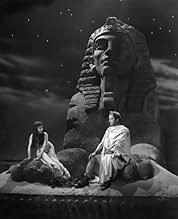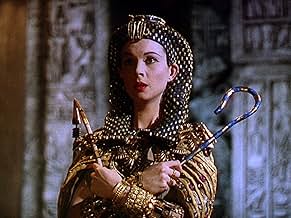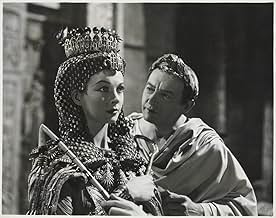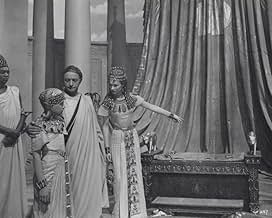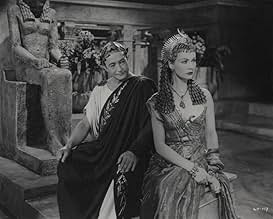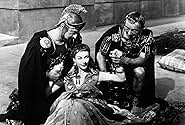IMDb RATING
6.2/10
3.3K
YOUR RATING
At the height of the Roman Civil War, a young Cleopatra (Vivien Leigh) meets a middle-aged Julius Caesar (Claude Rains), who teaches her how to rule Egypt.At the height of the Roman Civil War, a young Cleopatra (Vivien Leigh) meets a middle-aged Julius Caesar (Claude Rains), who teaches her how to rule Egypt.At the height of the Roman Civil War, a young Cleopatra (Vivien Leigh) meets a middle-aged Julius Caesar (Claude Rains), who teaches her how to rule Egypt.
- Nominated for 1 Oscar
- 2 nominations total
Anthony Eustrel
- Achillas
- (as Antony Eustrel)
James McKechnie
- 2nd. Centurion
- (as James Mc Kechnie)
Featured reviews
Impressive acting is the highlight of 1945's "Caesar and Cleopatra," a British production starring Vivien Leigh, Claude Rains, Stewart Granger, Flora Robson and Francis L. Sullivan. In smaller roles, you can spot Michael Rennie, Kay Kendall and Jean Simmons.
This production was not without its problems - made during World War II, bombings often delayed the filming; there was a five-week break while Vivien Leigh recovered from a miscarriage; and there was a shortage of materials to build the sets. Nevertheless, for a British film, this is a real spectacle and made in color, which was also unusual back then.
Shaw's Cleopatra (Leigh) is a childlike girl/woman who has hitting matches with her younger brother, runs, giggles, talks fast and becomes nervous at the thought of meeting the great Caesar (Rains). In the beginning, she meets him without realizing it. The two have a flirtation while he teaches her how to be a queen. Shaw's Caesar is an old man, a great warrior and a benevolent ruler who rules with a velvet glove rather than a sword.
Rains and Leigh are wonderful in their roles. Rains, as someone stated, with his Caesar haircut, weary face and beautiful profile looks as if he stepped out of that time period. His mastery of Shaw's language is magnificent, and he really holds the film together.
The stunningly beautiful Leigh, white-faced with glorious cheekbones and dazzling eyes, is a whimsical Cleopatra at first. She matures and becomes calmer and more regal as she learns how to be a queen, but she falls back into her childish ways in the presence of Caesar, particularly when he promises to send her Marc Anthony.
They say the camera adds 10 pounds - frankly, I'm surprised any of the actors could see Leigh, she is so tiny. She gives a sprightly, energetic performance. Shaw's Cleopatra is 16 (though in reality she is 20 or 21) - Leigh was 32 at the time of filming and comes off like the teenager Shaw wrote.
Stewart Granger as Apollodorus shows off his very hunky physique - no wonder he came to the attention of Hollywood. As two aides of Caesar's, Basil Sydney as Ruffio and Cecil Parker as Britanus give fine performances. Finally, Flora Robson as the protective, tough nursemaid of Cleopatra's, Ftatateeta, sinks her teeth into the role and is a force to contend with.
This movie flopped, probably because audiences thought it was going to be some huge spectacle - it's big for England, but it's not DeMille. Still, it's a real treat to see one of the classics done by two great actors who were well-trained and well-equipped to perform George Bernard Shaw.
This production was not without its problems - made during World War II, bombings often delayed the filming; there was a five-week break while Vivien Leigh recovered from a miscarriage; and there was a shortage of materials to build the sets. Nevertheless, for a British film, this is a real spectacle and made in color, which was also unusual back then.
Shaw's Cleopatra (Leigh) is a childlike girl/woman who has hitting matches with her younger brother, runs, giggles, talks fast and becomes nervous at the thought of meeting the great Caesar (Rains). In the beginning, she meets him without realizing it. The two have a flirtation while he teaches her how to be a queen. Shaw's Caesar is an old man, a great warrior and a benevolent ruler who rules with a velvet glove rather than a sword.
Rains and Leigh are wonderful in their roles. Rains, as someone stated, with his Caesar haircut, weary face and beautiful profile looks as if he stepped out of that time period. His mastery of Shaw's language is magnificent, and he really holds the film together.
The stunningly beautiful Leigh, white-faced with glorious cheekbones and dazzling eyes, is a whimsical Cleopatra at first. She matures and becomes calmer and more regal as she learns how to be a queen, but she falls back into her childish ways in the presence of Caesar, particularly when he promises to send her Marc Anthony.
They say the camera adds 10 pounds - frankly, I'm surprised any of the actors could see Leigh, she is so tiny. She gives a sprightly, energetic performance. Shaw's Cleopatra is 16 (though in reality she is 20 or 21) - Leigh was 32 at the time of filming and comes off like the teenager Shaw wrote.
Stewart Granger as Apollodorus shows off his very hunky physique - no wonder he came to the attention of Hollywood. As two aides of Caesar's, Basil Sydney as Ruffio and Cecil Parker as Britanus give fine performances. Finally, Flora Robson as the protective, tough nursemaid of Cleopatra's, Ftatateeta, sinks her teeth into the role and is a force to contend with.
This movie flopped, probably because audiences thought it was going to be some huge spectacle - it's big for England, but it's not DeMille. Still, it's a real treat to see one of the classics done by two great actors who were well-trained and well-equipped to perform George Bernard Shaw.
Shaw was a wonderful historian with a deadly eye for irony. Claude Rains brings off Caesar with withering poise and breezy wit, standing tall above the flashing eye of an Egyptian hurricane named Cleopatra (Vivien Leigh). Caesar's aide-de-camp is an affable bear of a man named Rufio (Basil Sydney), who mainly just keeps his eye on Caesar. Cleopatra is likewise sheltered by her scheming counselor Ftatateeta (Flora Robson), a name that not even Caesar can pronounce. Character actor Cecil Parker as Britannus adds quaintness and serendipity to an already splendid alchemy of spotty characters. The film moves by turns through a narrow skein of classical history as the reliquarian Egyptian world gives way to a streamlined Roman one. Along the way, we witness the contending parties encompassed and entangled in a delightful pantheon of wit, irony, satire, morals, manners, and adventure. Overall, a tremendously facile projection of one of England's sharpest satirical voices, G.B. Shaw.
When this film was recently shown on British television I recorded it on the rather naïve assumption that it would be a grand epic of Classical antiquity, something along the lines of the famously expensive Elizabeth Taylor "Cleopatra", still often cited as the costliest film ever made when values are adjusted for inflation. Of course, "Caesar and Cleopatra" is nothing of the sort; the British cinema never really had the budget to copy Hollywood in this respect although some European film-makers, especially in Italy, certainly tried to.
The film was certainly expensive by the standards of 1945; indeed, it was reported to be the most expensive film ever made in Britain at that date, costing well over a million pounds. It is not, however, a Hollywood-style epic but a cinematic adaptation of the play by George Bernard Shaw. While in the Egyptian capital city of Alexandria, Julius Caesar becomes involved in a power-struggle between Queen Cleopatra and the backers of her younger brother (and husband) Ptolemy. In real life Caesar and Cleopatra were lovers, but here their relationship is portrayed not as a romantic or a sexual one. The middle-aged Caesar is shown more as a father-figure to the youthful Cleopatra, a mentor who tutors her in the arts of politics and government. (And, given the intrigue-ridden nature of the Egyptian court, these are certainly areas where she could do with a little tuition).
Towards the end of his long life- this film was made five years before his death- Shaw was a revered figure of English literature, regarded as the nearest thing the twentieth century had produced to a Shakespeare. In more recent years this reputation has faded somewhat, partly because his plays are not always very dramatic. He can be stronger on philosophy and political theory than on action or dramatic tension, and even though his contributions to political and philosophical debates are often expressed in witty and vivid dialogue, the reader (and to an even greater extent the theatre-goer) is sometimes left with the impression that Shaw's linguistic gifts might have been better employed in penning political tracts than in writing for the stage.
Nevertheless, some of Shaw's plays have been turned into very good films, notably the 1938 "Pygmalion" with Leslie Howard and Wendy Hiller, or the 1941 "Major Barbara", also with Hiller and Robert Morley. (One could also include "My Fair Lady" in this list, but that is really second-hand Shaw, a musical based upon "Pygmalion" which owes much of its success to its songs). There have, unfortunately, also been a number of failures, such as "The Millionairess", which relied too heavily on Sophia Loren's glamour and the comic talents of Peter Sellers (which were not too much in evidence) and, although supposedly a comedy, ended up about as funny as a two-hour speech at a TUC conference.
"Caesar and Cleopatra" must also rank among the less successful Shaw adaptations. A lot of its million-pound-plus budget seems to have been spent on its lavish sets- economic and political considerations in 1945 precluded location shooting in Egypt itself- but from a modern perspective they seem like part of the problem, giving the whole production a very artificial, stagey look. It is said that the director Gabriel Pascal ordered sand from Egypt to get the colour right, but when everything else looks so artificial a gesture like that seems like an unnecessary luxury. The stagey impression is strengthened by the dialogue, both in the unnatural way it is spoken and, at times, in the way it is written. (Shaw could sometimes succumb to the delusion that if he was the twentieth-century Shakespeare it was incumbent on him to write in the style of his august predecessor, particularly when dealing with historical subjects).
The best acting performance comes from Claude Rains as Caesar. (I normally think of Rains as a supporting actor in roles like his French police chief in "Casablanca", so it was nice to see him in a leading role for once). This is not the Caesar of history, who was doubtless a lot more ruthless than he is portrayed here, but it is Caesar as Shaw wrote him, an essentially decent man whose undoubted sense of Realpolitik is tempered by his instincts towards humanity and clemency.
Vivien Leigh, however, is well below her best here. She may have been one of Britain's leading actresses of the period, but seems quite wrong for the part. She was 32 at the time, and never seems convincing as Cleopatra, whom Shaw envisaged as a kittenish teenager. A thirty-something Cleopatra would not, I am sure, have required any lessons from Caesar in statecraft.
Of the supporting cast, the best is Francis L. Sullivan as Ptolemy's wily and ambitious tutor Pothinus. The young Stewart Granger seems to have wandered in from another film, possibly one of the swashbuckling historical adventures which were later to become his stock-in-trade. Flora Robson has a thankless task as Cleopatra's nurse Ftatateeta, a character seemingly invented for the sole purpose of raising a laugh every time one of the other characters mispronounces her absurd name. Cecil Parker specialised in playing upper-middle-class English gentlemen and here he plays Caesar's slave Britannus as an upper-middle-class English gentleman transported back in time to Ancient Egypt, something which is never remotely convincing.
The film was described at the time as a "box office stinker"; evidently British audiences in the last year of the Second World War wanted something a bit more entertaining and uplifting than this wordy, overlong disquisition on the nature of political power. Some films which were "stinkers" when they first came out have gone on to become classics, but "Caesar and Cleopatra" seems to have gone in the opposite direction; today it is a little-known, rarely-seen curiosity. 5/10
The film was certainly expensive by the standards of 1945; indeed, it was reported to be the most expensive film ever made in Britain at that date, costing well over a million pounds. It is not, however, a Hollywood-style epic but a cinematic adaptation of the play by George Bernard Shaw. While in the Egyptian capital city of Alexandria, Julius Caesar becomes involved in a power-struggle between Queen Cleopatra and the backers of her younger brother (and husband) Ptolemy. In real life Caesar and Cleopatra were lovers, but here their relationship is portrayed not as a romantic or a sexual one. The middle-aged Caesar is shown more as a father-figure to the youthful Cleopatra, a mentor who tutors her in the arts of politics and government. (And, given the intrigue-ridden nature of the Egyptian court, these are certainly areas where she could do with a little tuition).
Towards the end of his long life- this film was made five years before his death- Shaw was a revered figure of English literature, regarded as the nearest thing the twentieth century had produced to a Shakespeare. In more recent years this reputation has faded somewhat, partly because his plays are not always very dramatic. He can be stronger on philosophy and political theory than on action or dramatic tension, and even though his contributions to political and philosophical debates are often expressed in witty and vivid dialogue, the reader (and to an even greater extent the theatre-goer) is sometimes left with the impression that Shaw's linguistic gifts might have been better employed in penning political tracts than in writing for the stage.
Nevertheless, some of Shaw's plays have been turned into very good films, notably the 1938 "Pygmalion" with Leslie Howard and Wendy Hiller, or the 1941 "Major Barbara", also with Hiller and Robert Morley. (One could also include "My Fair Lady" in this list, but that is really second-hand Shaw, a musical based upon "Pygmalion" which owes much of its success to its songs). There have, unfortunately, also been a number of failures, such as "The Millionairess", which relied too heavily on Sophia Loren's glamour and the comic talents of Peter Sellers (which were not too much in evidence) and, although supposedly a comedy, ended up about as funny as a two-hour speech at a TUC conference.
"Caesar and Cleopatra" must also rank among the less successful Shaw adaptations. A lot of its million-pound-plus budget seems to have been spent on its lavish sets- economic and political considerations in 1945 precluded location shooting in Egypt itself- but from a modern perspective they seem like part of the problem, giving the whole production a very artificial, stagey look. It is said that the director Gabriel Pascal ordered sand from Egypt to get the colour right, but when everything else looks so artificial a gesture like that seems like an unnecessary luxury. The stagey impression is strengthened by the dialogue, both in the unnatural way it is spoken and, at times, in the way it is written. (Shaw could sometimes succumb to the delusion that if he was the twentieth-century Shakespeare it was incumbent on him to write in the style of his august predecessor, particularly when dealing with historical subjects).
The best acting performance comes from Claude Rains as Caesar. (I normally think of Rains as a supporting actor in roles like his French police chief in "Casablanca", so it was nice to see him in a leading role for once). This is not the Caesar of history, who was doubtless a lot more ruthless than he is portrayed here, but it is Caesar as Shaw wrote him, an essentially decent man whose undoubted sense of Realpolitik is tempered by his instincts towards humanity and clemency.
Vivien Leigh, however, is well below her best here. She may have been one of Britain's leading actresses of the period, but seems quite wrong for the part. She was 32 at the time, and never seems convincing as Cleopatra, whom Shaw envisaged as a kittenish teenager. A thirty-something Cleopatra would not, I am sure, have required any lessons from Caesar in statecraft.
Of the supporting cast, the best is Francis L. Sullivan as Ptolemy's wily and ambitious tutor Pothinus. The young Stewart Granger seems to have wandered in from another film, possibly one of the swashbuckling historical adventures which were later to become his stock-in-trade. Flora Robson has a thankless task as Cleopatra's nurse Ftatateeta, a character seemingly invented for the sole purpose of raising a laugh every time one of the other characters mispronounces her absurd name. Cecil Parker specialised in playing upper-middle-class English gentlemen and here he plays Caesar's slave Britannus as an upper-middle-class English gentleman transported back in time to Ancient Egypt, something which is never remotely convincing.
The film was described at the time as a "box office stinker"; evidently British audiences in the last year of the Second World War wanted something a bit more entertaining and uplifting than this wordy, overlong disquisition on the nature of political power. Some films which were "stinkers" when they first came out have gone on to become classics, but "Caesar and Cleopatra" seems to have gone in the opposite direction; today it is a little-known, rarely-seen curiosity. 5/10
Up to the time it was released in 1945 Caesar and Cleopatra was the most expensive British film ever made. It was as though the British cinema was trying to show America it could do a DeMille like epic as good as Cecil B. DeMille or anyone else from Hollywood. It may have been a little too overdone. Director Gabriel Pascal might have gotten a bit carried away with the spectacle and the audience might well have missed some of George Bernard Shaw's inspired dialog.
And Pascal had the advantage of the aged Mr. Shaw personally supervising the production. Of course Shaw insisted on total fidelity to his play and the ideas therein. I understand that J. Arthur Rank wanted to have a little sex and romance in there, like DeMille did do, but Shaw would have none of it.
What sets Caesar and Cleopatra apart from other Cleopatra stories that starred Theda Bara, Elizabeth Taylor, and Claudette Colbert is that Shaw portrayed her as probably what she was, a silly teenager who just happens to be Queen of Egypt. There's a little bit of Scarlett O'Hara in Vivien Leigh's performance as she moves from silly teen to a young women well schooled in statecraft by Julius Caesar.
Claude Rains plays a world weary Julius Caesar and the Shavian quips roll off his tongue with great aplomb. Like George Bernard Shaw's other masterpiece Pygmalion, Rains tutors Leigh and the results far exceed what he could have hoped for.
Production on Caesar and Cleopatra was begun while there was still a shooting war in Europe and V-2s and other such explosive devices were still raining down on the United Kingdom. A couple came real close to the studio in London this was being filmed at.
Stewart Granger got his first real notice in this film playing Apollodorus and Francis L. Sullivan plays a blustering and plotting Pothinos. If you look hard among the various slave women you will find both Jean Simmons and Kay Kendall among the extras.
You will also like both Basil Sydney as Ruffio and Cecil Parker as Britanus, two aides to Caesar who both occasionally give him a reality check.
Caesar and Cleopatra failed to recoup the cost of making it in initial release. J. Arthur Rank misjudged the British public taste post World War II. Maybe a little less expense and more attention to Shaw's words and the film might have been better.
Still it's pretty good as is.
And Pascal had the advantage of the aged Mr. Shaw personally supervising the production. Of course Shaw insisted on total fidelity to his play and the ideas therein. I understand that J. Arthur Rank wanted to have a little sex and romance in there, like DeMille did do, but Shaw would have none of it.
What sets Caesar and Cleopatra apart from other Cleopatra stories that starred Theda Bara, Elizabeth Taylor, and Claudette Colbert is that Shaw portrayed her as probably what she was, a silly teenager who just happens to be Queen of Egypt. There's a little bit of Scarlett O'Hara in Vivien Leigh's performance as she moves from silly teen to a young women well schooled in statecraft by Julius Caesar.
Claude Rains plays a world weary Julius Caesar and the Shavian quips roll off his tongue with great aplomb. Like George Bernard Shaw's other masterpiece Pygmalion, Rains tutors Leigh and the results far exceed what he could have hoped for.
Production on Caesar and Cleopatra was begun while there was still a shooting war in Europe and V-2s and other such explosive devices were still raining down on the United Kingdom. A couple came real close to the studio in London this was being filmed at.
Stewart Granger got his first real notice in this film playing Apollodorus and Francis L. Sullivan plays a blustering and plotting Pothinos. If you look hard among the various slave women you will find both Jean Simmons and Kay Kendall among the extras.
You will also like both Basil Sydney as Ruffio and Cecil Parker as Britanus, two aides to Caesar who both occasionally give him a reality check.
Caesar and Cleopatra failed to recoup the cost of making it in initial release. J. Arthur Rank misjudged the British public taste post World War II. Maybe a little less expense and more attention to Shaw's words and the film might have been better.
Still it's pretty good as is.
CAESAR AND CLEOPATRA (1945), based on George Bernard Shaw's play and directed by Gabriel Pascal, is a very unique movie that combines all precious aspects of film art. It is not purely a historical movie since it contains a lot of inaccuracies that appear to be illogical from a historical perspective. Nevertheless, one has to analyze it in a deeper understanding, taking into account other factors that make the film a precious piece of post-war cinema. Therefore, it is impossible to see it without the consideration of other aspects, or more clearly, other figures that significantly affect the movie in general: George Bernard Shaw with his style filled with wit and elegance; and Vivien Leigh with her extraordinary acting skills. Let me consider the three aforementioned aspects: history, Shaw and Leigh.
HISTORY: It is true that if you know Cleopatra's story and the events connected with the Roman conquest over Egypt, you will feel confused or even disappointed with the content of this film. Cleopatra definitely did not learn to be a queen from Caesar that much as she does here. She was a very intelligent woman with "foxy" plans as for Caesar and Rome(in this case, I would recommend CLEOPATRA by DeMille (1934) or by Mankiewicz (1963). The film by Pascal presents, in part justifiably, a total mess in Egypt that Caesar finds when he steps into its politics. This is proved by the way Cleopatra and her brother Ptolemy are showed - two kids rather than rulers who compete for power. However, there are some strong historical points in the film that must be seen together with shortcomings. First, the film very well presents the Romans together with their leader Julius Caesar wonderfully played by Claude Rains. There is a very realistic scene of Roman legions entering Alexandria, the capital of Egypt. I also liked the way Caesar's personality is developed - someone who is full of contradictions rather than an "almighty" conqueror. These aspects make the film more authentic and ancient heroes more humane. However, it cannot be treated as a historical work for sure.
GEORGE BERNARD SHAW: But all must be thanked not only to the director but to this great classic playwright. G.B. Shaw is noticeable throughout, particularly through magnificent elegance. The director, Gabriel Pascal, really retains everything that one can find in Shaw's play. Therefore, any Shaw's fan, including the one with richest imagination will not be disappointed thanks to the marvelous elegance in this movie. In other words, the pictures of the film will not leave anything else to wish. The lavish sets, the costumes, simply BEAUTY noticeable in most of the scenes! Wit is another aspect. This is most effective in the scenes with Caesar and Cleopatra. "You will soon learn how to govern" says Cleopatra to mighty Caesar after a day or two of his lessons of ruling. Or the jumps into the sea (Apollodorus, Caesar and .... Cleopatra) - quite unique!
VIVIEN LEIGH: Before seeing the film, I did not expect her to be as good as her Scarlett O'Hara in GONE WITH THE WIND (1939). Now I must say that she is better as Cleopatra. Vivien gives a marvelous performance as a girl dreaming of a handsome man with strong arms who could protect her, and as a girl who later changes into a courageous, mighty queen. "If one man in all Alexandria can be found to say I did wrong, I swear to have myself be crucified on the door of the palace by my own slaves," which she says to Caesar after ordering Pothinus to be killed. And how wonderfully she plays one of the first scenes when she, in very unpredictable circumstances, finds out that the stranger she met at the Sphynx and with whom she talked so trust-worthily, is Caesar himself. UNFORGETTABLE! A lot of people associate only Liz Taylor with film Cleopatra. Not to mention Claudette Colbert, it is a pity they don't find Leigh's performance as worth highest attention.
It would be unfair to skip one more factor: other cast. Vivien shines in her role but others do very good jobs as well. Claude Rains is a very different Caesar than in most other films (actors who played him were, among others, Rex Harrison, William Warren, Fritz Leibner). But he is unforgettable, his face reflects a spirit of antiquity. Flora Robson who gives a memorable performance of Cleopatra's bossy servant Ftatateeta, stresses rather male features of character. She does it wonderfully through her gestures and low voice. And Francis L Sullivan as Pothinus - really worth attention!
All in all, there are many other aspects that make the movie highly recommended. Of course, it is difficult to mention everything in one review. All I can say at the end of my review is:
Do see the film!
If you are Shaw's fan, you will find his spirit throughout.
If you are Vivien Leigh's fan, you will be absolutely amazed by her performance.
If you are fond of historical, lavish epics, there will definitely be something wonderful that you will appreciate in CAESAR AND CLEOPATRA. 8/10!
HISTORY: It is true that if you know Cleopatra's story and the events connected with the Roman conquest over Egypt, you will feel confused or even disappointed with the content of this film. Cleopatra definitely did not learn to be a queen from Caesar that much as she does here. She was a very intelligent woman with "foxy" plans as for Caesar and Rome(in this case, I would recommend CLEOPATRA by DeMille (1934) or by Mankiewicz (1963). The film by Pascal presents, in part justifiably, a total mess in Egypt that Caesar finds when he steps into its politics. This is proved by the way Cleopatra and her brother Ptolemy are showed - two kids rather than rulers who compete for power. However, there are some strong historical points in the film that must be seen together with shortcomings. First, the film very well presents the Romans together with their leader Julius Caesar wonderfully played by Claude Rains. There is a very realistic scene of Roman legions entering Alexandria, the capital of Egypt. I also liked the way Caesar's personality is developed - someone who is full of contradictions rather than an "almighty" conqueror. These aspects make the film more authentic and ancient heroes more humane. However, it cannot be treated as a historical work for sure.
GEORGE BERNARD SHAW: But all must be thanked not only to the director but to this great classic playwright. G.B. Shaw is noticeable throughout, particularly through magnificent elegance. The director, Gabriel Pascal, really retains everything that one can find in Shaw's play. Therefore, any Shaw's fan, including the one with richest imagination will not be disappointed thanks to the marvelous elegance in this movie. In other words, the pictures of the film will not leave anything else to wish. The lavish sets, the costumes, simply BEAUTY noticeable in most of the scenes! Wit is another aspect. This is most effective in the scenes with Caesar and Cleopatra. "You will soon learn how to govern" says Cleopatra to mighty Caesar after a day or two of his lessons of ruling. Or the jumps into the sea (Apollodorus, Caesar and .... Cleopatra) - quite unique!
VIVIEN LEIGH: Before seeing the film, I did not expect her to be as good as her Scarlett O'Hara in GONE WITH THE WIND (1939). Now I must say that she is better as Cleopatra. Vivien gives a marvelous performance as a girl dreaming of a handsome man with strong arms who could protect her, and as a girl who later changes into a courageous, mighty queen. "If one man in all Alexandria can be found to say I did wrong, I swear to have myself be crucified on the door of the palace by my own slaves," which she says to Caesar after ordering Pothinus to be killed. And how wonderfully she plays one of the first scenes when she, in very unpredictable circumstances, finds out that the stranger she met at the Sphynx and with whom she talked so trust-worthily, is Caesar himself. UNFORGETTABLE! A lot of people associate only Liz Taylor with film Cleopatra. Not to mention Claudette Colbert, it is a pity they don't find Leigh's performance as worth highest attention.
It would be unfair to skip one more factor: other cast. Vivien shines in her role but others do very good jobs as well. Claude Rains is a very different Caesar than in most other films (actors who played him were, among others, Rex Harrison, William Warren, Fritz Leibner). But he is unforgettable, his face reflects a spirit of antiquity. Flora Robson who gives a memorable performance of Cleopatra's bossy servant Ftatateeta, stresses rather male features of character. She does it wonderfully through her gestures and low voice. And Francis L Sullivan as Pothinus - really worth attention!
All in all, there are many other aspects that make the movie highly recommended. Of course, it is difficult to mention everything in one review. All I can say at the end of my review is:
Do see the film!
If you are Shaw's fan, you will find his spirit throughout.
If you are Vivien Leigh's fan, you will be absolutely amazed by her performance.
If you are fond of historical, lavish epics, there will definitely be something wonderful that you will appreciate in CAESAR AND CLEOPATRA. 8/10!
Did you know
- TriviaThe role of Caesar originally was offered to Sir John Gielgud, who turned it down because he detested Director Gabriel Pascal.
- GoofsCaesar refers to his nose as "rather long" and "a Roman nose," but the idea of a "Roman nose" was not introduced until almost 150 years later, when the Emperor Hadrian erected statues of his favorite, Antinous, throughout the Empire (where many of the people had never seen a Roman), and Antinous's long nose was taken as typical of Romans (even though Antinous was a Greek).
- Quotes
Julius Caesar: And so to the end of history, murder shall breed murder, always in the name of right, and justice, and peace, until the gods create a race of men that can understand.
- Crazy creditsClosing credits cast list finishes with And The Crowd.
- ConnectionsFeatured in Great Performances: Laurence Olivier: A Life (1983)
- How long is Caesar and Cleopatra?Powered by Alexa
Details
Box office
- Budget
- £1,278,000 (estimated)
- Runtime2 hours 18 minutes
- Aspect ratio
- 1.37 : 1
Contribute to this page
Suggest an edit or add missing content



